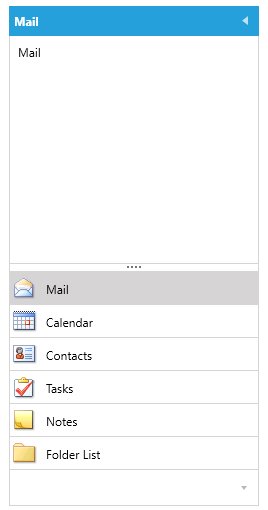Getting Started with Silverlight OutlookBar
Adding the RadOutlookBar to the page
In order to use RadOutlookBar control in your projects you have to add references to the following assemblies:
- Telerik.Windows.Controls
- Telerik.Windows.Controls.Navigation
You can find more info here.
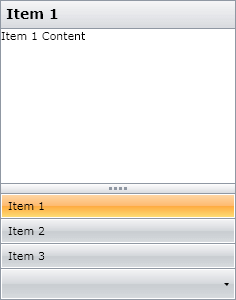
Adding icons to the items
Example 1
<telerik:RadOutlookBar>
<telerik:RadOutlookBarItem Header="Item 1" Icon="Letter.png">
<TextBlock Text="Item 1 Content" />
</telerik:RadOutlookBarItem>
<telerik:RadOutlookBarItem Header="Item 2"
Icon="Letter.png"
IsSelected="True">
<TextBlock Text="Item 2 Content" />
</telerik:RadOutlookBarItem>
<telerik:RadOutlookBarItem Header="Item 3" Icon="Letter.png">
<TextBlock Text="Item 3 Content" />
</telerik:RadOutlookBarItem>
</telerik:RadOutlookBar>
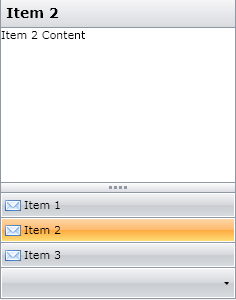
Selecting item
By default the first item will be selected. In order to select another item you can use the IsSelected property.
Example 2
<UserControl xmlns="http://schemas.microsoft.com/winfx/2006/xaml/presentation"
xmlns:x="http://schemas.microsoft.com/winfx/2006/xaml"
xmlns:d="http://schemas.microsoft.com/expression/blend/2008"
xmlns:mc="http://schemas.openxmlformats.org/markup-compatibility/2006"
xmlns:telerik="http://schemas.telerik.com/2008/xaml/presentation">
<Grid x:Name="LayoutRoot">
<telerik:RadOutlookBar >
<telerik:RadOutlookBarItem Header="Item 1">
<TextBlock Text="Item 1 Content" />
</telerik:RadOutlookBarItem>
<telerik:RadOutlookBarItem Header="Item 2">
<TextBlock Text="Item 2 Content" />
</telerik:RadOutlookBarItem>
<telerik:RadOutlookBarItem Header="Item 3">
<TextBlock Text="Item 3 Content" />
</telerik:RadOutlookBarItem>
</telerik:RadOutlookBar>
</Grid>
</UserControl>
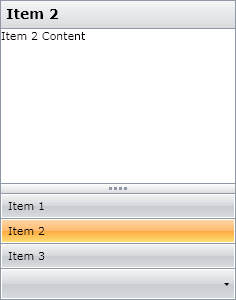
Handling changes in the selection
To handle the changes in the selection you can use the SelectionChanged event of the RadOutlookBar:
Example 3
<telerik:RadOutlookBar x:Name="RadOutlookBar1" SelectionChanged="RadOutlookBar1_SelectionChanged">
<telerik:RadOutlookBarItem Header="Item 1" Icon="Letter.png">
<TextBlock Text="Item 1 Content" />
</telerik:RadOutlookBarItem>
<telerik:RadOutlookBarItem Header="Item 2"
Icon="Letter.png"
IsSelected="True">
<TextBlock Text="Item 2 Content" />
</telerik:RadOutlookBarItem>
<telerik:RadOutlookBarItem Header="Item 3" Icon="Letter.png">
<TextBlock Text="Item 3 Content" />
</telerik:RadOutlookBarItem>
</telerik:RadOutlookBar>
Example 4
private void RadOutlookBar1_SelectionChanged(object sender, RoutedEventArgs e)
{
RadOutlookBarItem newSelectedItem = (sender as RadOutlookBar).SelectedItem as RadOutlookBarItem;
}
Private Sub RadOutlookBar1_SelectionChanged(ByVal sender As Object, ByVal e As RoutedEventArgs)
Dim newSelectedItem As RadOutlookBarItem = TryCast(TryCast(sender, RadOutlookBar).SelectedItem, RadOutlookBarItem)
End Sub
Limiting active items
To limit the number of items that can be displayed in the active area you can use the ActiveItemsMaxCount property:
Example 5
<telerik:RadOutlookBar ActiveItemsMaxCount="2">
<telerik:RadOutlookBarItem Header="Item 1" Icon="Letter.png">
<TextBlock Text="Item 1 Content" />
</telerik:RadOutlookBarItem>
<telerik:RadOutlookBarItem Header="Item 2"
Icon="Letter.png"
IsSelected="True">
<TextBlock Text="Item 2 Content" />
</telerik:RadOutlookBarItem>
<telerik:RadOutlookBarItem Header="Item 3" Icon="Letter.png">
<TextBlock Text="Item 3 Content" />
</telerik:RadOutlookBarItem>
</telerik:RadOutlookBar>
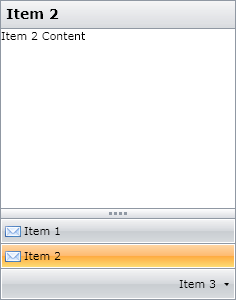
Setting a Theme
The controls from our suite support different themes. You can see how to apply a theme different than the default one in the Setting a Theme help article.
Changing the theme using implicit styles will affect all controls that have styles defined in the merged resource dictionaries. This is applicable only for the controls in the scope in which the resources are merged.
To change the theme, you can follow the steps below:
Choose between the themes and add reference to the corresponding theme assembly (ex: Telerik.Windows.Themes.Windows8.dll). You can see the different themes applied in the Theming examples from our Silverlight Controls Examples application.
-
Merge the ResourceDictionaries with the namespace required for the controls that you are using from the theme assembly. For the RadOutlookBar, you will need to merge the following resources:
- Telerik.Windows.Controls
- Telerik.Windows.Controls.Navigation
Example 6 demonstrates how to merge the ResourceDictionaries so that they are applied globally for the entire application.
Example 6: Merge the ResourceDictionaries
<Application.Resources>
<ResourceDictionary>
<ResourceDictionary.MergedDictionaries>
<ResourceDictionary Source="/Telerik.Windows.Themes.Windows8;component/Themes/System.Windows.xaml"/>
<ResourceDictionary Source="/Telerik.Windows.Themes.Windows8;component/Themes/Telerik.Windows.Controls.xaml"/>
<ResourceDictionary Source="/Telerik.Windows.Themes.Windows8;component/Themes/Telerik.Windows.Controls.Navigation.xaml"/>
</ResourceDictionary.MergedDictionaries>
</ResourceDictionary>
</Application.Resources>
Alternatively, you can use the theme of the control via the StyleManager.
Figure 2 shows a RadOutlookBar with the Windows8 theme applied.
Figure 2: RadOutlookBar with the Windows8 theme
